一般将来时练习题及答案,部分难题有详解
英语一般将来时试题(有答案和解析)含解析
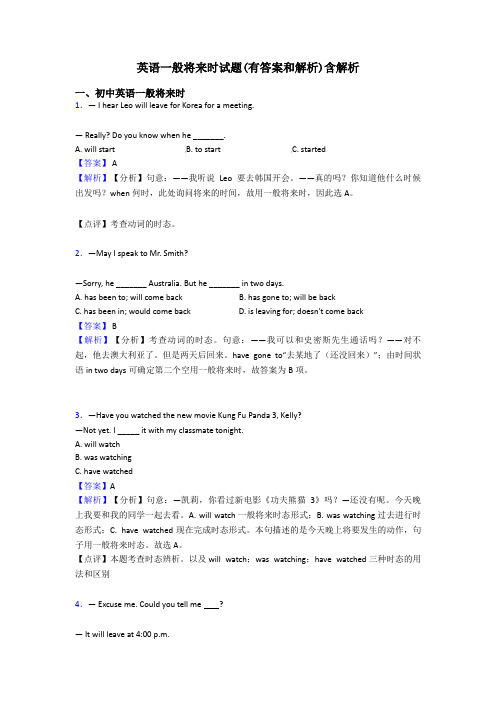
英语一般将来时试题(有答案和解析)含解析一、初中英语一般将来时1.— I hear Leo will leave for Korea for a meeting.— Really? Do you know when he _______.A. will startB. to startC. started【答案】 A【解析】【分析】句意:——我听说Leo要去韩国开会。
——真的吗?你知道他什么时候出发吗?when何时,此处询问将来的时间,故用一般将来时,因此选A。
【点评】考查动词的时态。
2.—May I speak to Mr. Smith?—Sorry, he _______ Australia. But he _______ in two days.A. has been to; will come backB. has gone to; will be backC. has been in; would come backD. is leaving for; doesn't come back【答案】 B【解析】【分析】考查动词的时态。
句意:——我可以和史密斯先生通话吗?——对不起,他去澳大利亚了。
但是两天后回来。
have gone to“去某地了(还没回来)”;由时间状语in two days可确定第二个空用一般将来时,故答案为B项。
3.—Have you watched the new movie Kung Fu Panda 3, Kelly?—Not yet. I _____ it with my classmate tonight.A. will watchB. was watchingC. have watched【答案】A【解析】【分析】句意:—凯莉,你看过新电影《功夫熊猫3》吗?—还没有呢。
今天晚上我要和我的同学一起去看。
A. will watch一般将来时态形式;B. was watching过去进行时态形式;C. have watched现在完成时态形式。
(英语)一般将来时练习题含答案含解析

(英语)一般将来时练习题含答案含解析一、单项选择一般将来时1.— Tom! I forgot to bring my notebook this morning.—Don’t worry! I it for you.A.will get B.gets C.am getting D.am going to get 【答案】A【解析】试题分析:句意:--汤姆,别忘了今天早上把我的笔记本带来。
--别担心,我会给你带来的。
这里是用一般将来时,will do表示“愿意做,临时决定”,一般现在时代替一般将来时是用于时刻表中即将做…,现在进行时代替一般将来时是表示“马上做”,用于表示移动的动作,be going to则是表示“计划,安排”,所以选A。
考点:考查时态2.Sarah ______ for Beijing tomorrow, so she can’t go to have a picnic with us.A.had left B.has leftC.is being left D.is leaving【答案】D【解析】试题分析:句意:Sarah明天就要动身去北京了,所以他不能和我们一起去野餐了。
根据tomorrow判断句子表示将来,而选项中只有D选项可以用现在进行时表示将要发生的事情,选D。
考点:考查动词时态。
3.If their marketing plans succeed, they ________ their sales by 20 percent.A.will increase B.have been increasingC.have increased D.would be increasing【答案】A【解析】句意:要是他们的市场计划成功了,他们将增加20%的销售额。
从句是一般现在时表将来,主句常用一般将来时或情态动词can/may+动词原形。
4.It is only with the help of scientific research _____ bring PM1 air pollution under control. A.that we will B.we willC.that we do D.do we【答案】A【解析】试题分析:考查强调句结构。
【英语】一般将来时难题及答案
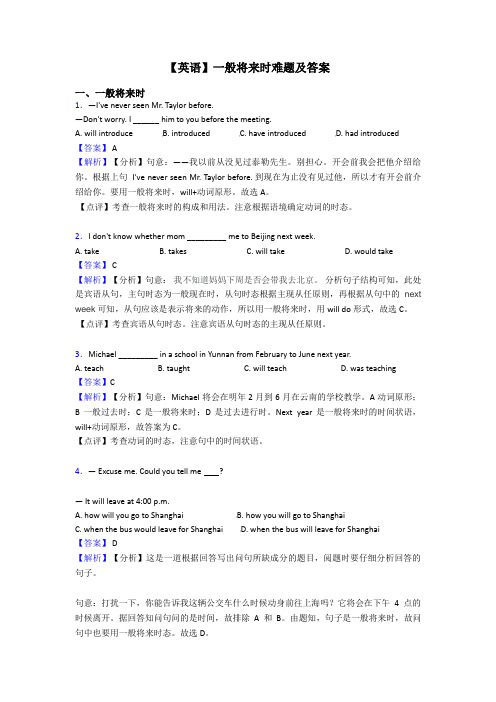
【英语】一般将来时难题及答案一、一般将来时1.—I've never seen Mr. Taylor before.—Don't worry. I ______ him to you before the meeting.A. will introduceB. introducedC. have introducedD. had introduced【答案】 A【解析】【分析】句意:——我以前从没见过泰勒先生。
别担心。
开会前我会把他介绍给你。
根据上句 I've never seen Mr. Taylor before. 到现在为止没有见过他,所以才有开会前介绍给你。
要用一般将来时,will+动词原形。
故选A。
【点评】考查一般将来时的构成和用法。
注意根据语境确定动词的时态。
2.I don't know whether mom _________ me to Beijing next week.A. takeB. takesC. will takeD. would take【答案】 C【解析】【分析】句意:我不知道妈妈下周是否会带我去北京。
分析句子结构可知,此处是宾语从句,主句时态为一般现在时,从句时态根据主现从任原则,再根据从句中的next week可知,从句应该是表示将来的动作,所以用一般将来时,用will do形式,故选C。
【点评】考查宾语从句时态。
注意宾语从句时态的主现从任原则。
3.Michael _________ in a school in Yunnan from February to June next year.A. teachB. taughtC. will teachD. was teaching【答案】C【解析】【分析】句意:Michael将会在明年2月到6月在云南的学校教学。
A动词原形;B一般过去时;C是一般将来时;D是过去进行时。
Next year是一般将来时的时间状语,will+动词原形,故答案为C。
英语一般将来时专题练习(及答案)及解析
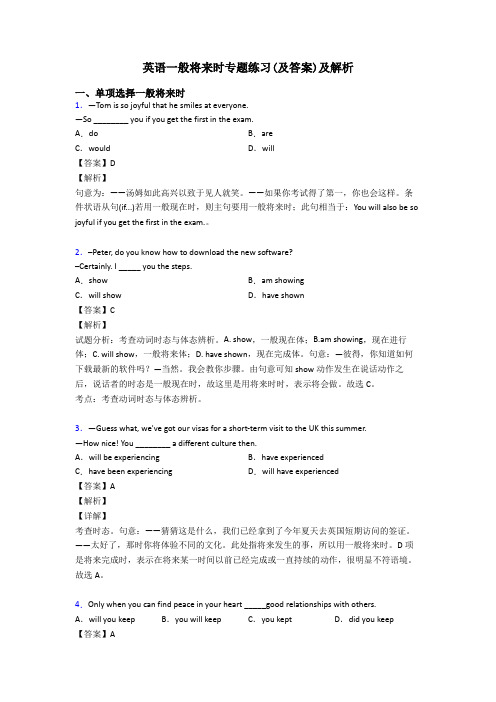
C.would have increasedD.will be increasing
【答案】B
【解析】
试题分析:考查时态。If条件句使用的是一般现在时代替一般将来时,所以主句也是一般将来时,和next year搭配使用。句意:如果我们的营销计划成功,我们明年销售将增加百分之三十。故B正确。
【解析】
句意为:——汤姆如此高兴以致于见人就笑。——如果你考试得了第一,你也会这样。条件状语从句(if...)若用一般现在时,则主句要用一般将来时;此句相当于:You will also be so joyful if you get the first in the exam.。
2.–Peter, do you know how to download the new software?
19.If he ________ exercise, he______ healthy.
A.not; will B.isn’t; won’t be
C.doesn’t; will be D.doesn’t do; won’t be
【答案】D
【解析】
【详解】
考查if条件句中的时态。句意:如果他不做运动,他就不会健康。If条件句,如果主句用一般将来时态,则从句用一般现在时态,且句子主语是he,单数第三人称,故选D。
考点:考查时态
10.It is required that the students _____ mobile phones in their school, so seldom _____ them using one.
A.should not use; you will see
一般将来时讲解及练习(含答案)
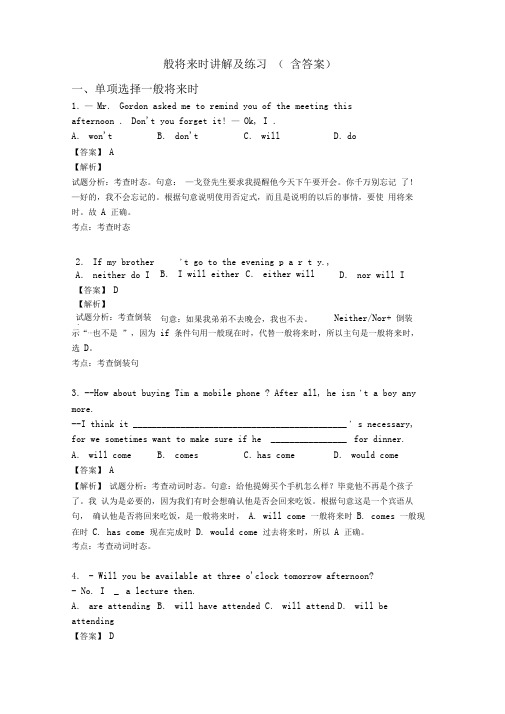
般将来时讲解及练习(含答案)一、单项选择一般将来时1.—Mr.Gordon asked me to remind you of the meeting thisafternoon .Don't you forget it! —Ok, I .A.won't B.don't C.will D.do【答案】A【解析】试题分析:考查时态。
句意:—戈登先生要求我提醒他今天下午要开会。
你千万别忘记了!—好的,我不会忘记的。
根据句意说明使用否定式,而且是说明的以后的事情,要使用将来时。
故A 正确。
考点:考查时态2.If my brother doesn 't go to the evening p a r t y.,A.neither do I B.I will either C.either willI D.nor will I【答案】D 【解析】试题分析:考查倒装句:句意:如果我弟弟不去晚会,我也不去。
Neither/Nor+ 倒装句,表示“⋯也不是”,因为if 条件句用一般现在时,代替一般将来时,所以主句是一般将来时,选D。
考点:考查倒装句3.--How about buying Tim a mobile phone ? After all, he isn 't a boy any more.--I think it _____________________________________________ ' s necessary, for we sometimes want to make sure if he ________________ for dinner. A.will come B.comes C.has come D.would come【答案】A【解析】试题分析:考查动词时态。
句意:给他提姆买个手机怎么样?毕竟他不再是个孩子了。
我认为是必要的,因为我们有时会想确认他是否会回来吃饭。
【英语】英语一般将来时答题技巧及练习题(含答案)含解析

【英语】英语一般将来时答题技巧及练习题(含答案)含解析一、初中英语一般将来时1.—Do you know ______?—The day after tomorrow.A. when we visited the museumB. when we will visit the museumC. when did we visit the museumD. when will we visit the museum【答案】 B【解析】【分析】句意:——你知道我们什么时候参过博物馆吗?——后天。
Do you know 后接宾语从句,应使用陈述结构,因此排除C和D,根据答语The day after tomorrow.可知问句使用一般将来时,故答案是B。
【点评】考查宾语从句的语序各时态,注意宾语从句使用陈述语序,根据答语确定问句的时态。
2.I’m so lucky because I see more cartoon characters next month.A. is able toB. will be able toC. be able toD. was able to【答案】B【解析】【分析】句意:我真幸运因为我下个月能看到更多的卡通人物。
next month表将来,因此用will be able to。
故选B。
【点评】考查一般将来时。
3.—Do you know when Mrs. White for dinner this evening?—No, but I think she when she is free.A. will come; will comeB. will come; comesC. comes; will come【答案】 A【解析】【分析】句意:——你知道怀特太太今晚是否来吃晚饭吗?——不知道。
但我认为如果她有空,她会来。
空一,句子为含有宾语从句的主从复合句,主句是一般现在时,从句用它所需要的任何时态,根据this evening今晚,可知句子为一般将来时,will come;空二,回答是when引导的时间状语从句,从句是一般现在时,主句应用将来时,will come,故选A。
英语一般将来时试题(有答案和解析)含解析

英语一般将来时试题(有答案和解析)含解析一、初中英语一般将来时1.I wonder when they ________ for Beijing. I will go to the train station to see them off when they ________.A. will leave; leaveB. leave; will leaveC. go; leaveD. will go; leave【答案】 A【解析】【分析】句意:我想知道他们什么时候去北京。
当他们离开的时候,我将去车站送他们。
leave for,动身前往,去……。
第一句话是宾语从句,因此从句可以使用一般将来时,第二句是when引导的时间状语从句,应遵循主将从现的原则,因此应使用一般现在时,故答案是A。
【点评】考查动词辨析和时间状语从句中的主将从现原则。
注意识记固定搭配leave for,同时只要记住在时间状语从句中的主将从现原则。
2.With the development of science and technology, robot cooks ______ in our families in the future.A. appearB. appearedC. will appearD. were appearing【答案】 C【解析】【分析】句意:随着科学技术的发展,在未来机器人厨师将出现在我们的家庭中. 根据in the future可知,此句表示动作发生在将来,所以用一般将来时态;一般将来时态结构为:will+动词原形,故选C.【点评】判断动词的时态,要通过所给的时间状语、提示词或语境去判断动词存在的状态. 一般将来时态结构为:will+动词原形.3.— I hear your father has gone to Tokyo on business?— Yes. And he _______ in three weeks.A. has returnedB. will returnC. would returnD. returns【答案】 B【解析】【分析】句意:—我听说你父亲出差去日本了?—是的。
【英语】英语一般将来时常见题型及答题技巧及练习题(含答案)
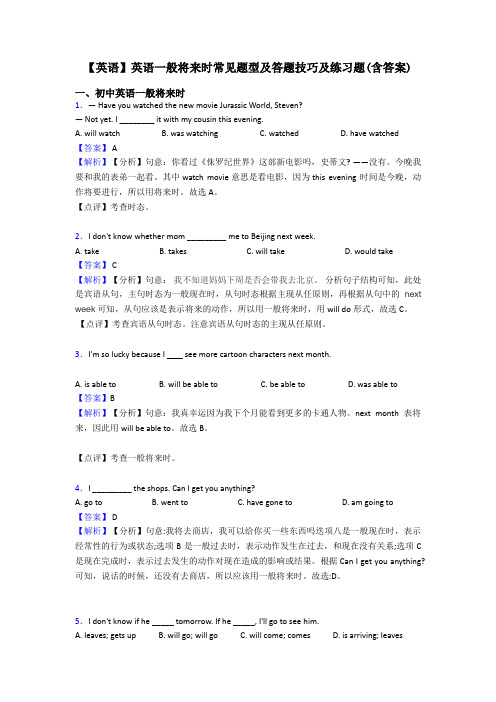
【英语】英语一般将来时常见题型及答题技巧及练习题(含答案)一、初中英语一般将来时1.— Have you watched the new movie Jurassic World, Steven?— Not yet. I ________ it with my cousin this evening.A. will watchB. was watchingC. watchedD. have watched【答案】 A【解析】【分析】句意:你看过《侏罗纪世界》这部新电影吗,史蒂文? ——没有。
今晚我要和我的表弟一起看。
其中watch movie意思是看电影,因为this evening 时间是今晚,动作将要进行,所以用将来时。
故选A。
【点评】考查时态。
2.I don't know whether mom _________ me to Beijing next week.A. takeB. takesC. will takeD. would take【答案】 C【解析】【分析】句意:我不知道妈妈下周是否会带我去北京。
分析句子结构可知,此处是宾语从句,主句时态为一般现在时,从句时态根据主现从任原则,再根据从句中的next week可知,从句应该是表示将来的动作,所以用一般将来时,用will do形式,故选C。
【点评】考查宾语从句时态。
注意宾语从句时态的主现从任原则。
3.I’m so lucky because I see more cartoon characters next month.A. is able toB. will be able toC. be able toD. was able to【答案】B【解析】【分析】句意:我真幸运因为我下个月能看到更多的卡通人物。
next month表将来,因此用will be able to。
故选B。
【点评】考查一般将来时。
4.I _________ the shops. Can I get you anything?A. go toB. went toC. have gone toD. am going to【答案】 D【解析】【分析】句意:我将去商店,我可以给你买一些东西吗迭项八是一般现在时,表示经常性的行为或状态;选项B是一般过去时,表示动作发生在过去,和现在没有关系;选项C 是现在完成时,表示过去发生的动作对现在造成的影响或结果。
【英语】 一般将来时练习题基础、提高、难题_汇总(含答案)
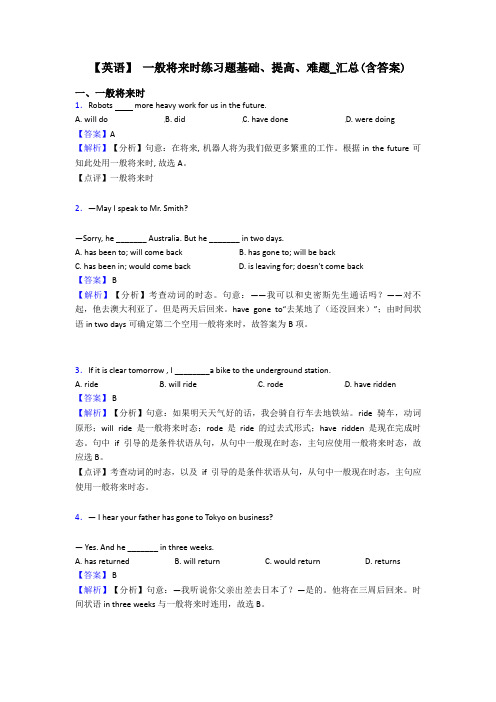
【英语】一般将来时练习题基础、提高、难题_汇总(含答案)一、一般将来时1.Robots more heavy work for us in the future.A. will doB. didC. have doneD. were doing【答案】A【解析】【分析】句意:在将来, 机器人将为我们做更多繁重的工作。
根据in the future 可知此处用一般将来时, 故选A。
【点评】一般将来时2.—May I speak to Mr. Smith?—Sorry, he _______ Australia. But he _______ in two days.A. has been to; will come backB. has gone to; will be backC. has been in; would come backD. is leaving for; doesn't come back【答案】 B【解析】【分析】考查动词的时态。
句意:——我可以和史密斯先生通话吗?——对不起,他去澳大利亚了。
但是两天后回来。
have gone to“去某地了(还没回来)”;由时间状语in two days可确定第二个空用一般将来时,故答案为B项。
3.If it is clear tomorrow , I ________a bike to the underground station.A. rideB. will rideC. rodeD. have ridden【答案】 B【解析】【分析】句意:如果明天天气好的话,我会骑自行车去地铁站。
ride骑车,动词原形;will ride是一般将来时态;rode是ride的过去式形式;have ridden是现在完成时态。
句中if引导的是条件状语从句,从句中一般现在时态,主句应使用一般将来时态,故应选B。
【点评】考查动词的时态,以及if引导的是条件状语从句,从句中一般现在时态,主句应使用一般将来时态。
【英语】一般将来时难题及答案(word)

【英语】一般将来时难题及答案(word)一、一般将来时1.With the development of science and technology, robot cooks ______ in our families in the future.A. appearB. appearedC. will appearD. is appearing【答案】C【解析】【分析】句意:随着科技的发展,机器人厨师将来会出现在我们的家庭中。
A是一般现在时;B是一般过去时;C是一般将来时;D是现在进行时。
句中的in the future是一般将来时的标志,故答案为C。
【点评】考查考查动词的时态,注意时间状语的暗示作用。
2.—May I speak to Mr. Smith?—Sorry, he _______ Australia. But he _______ in two days.A. has been to; will come backB. has gone to; will be backC. has been in; would come backD. is leaving for; doesn't come back【答案】 B【解析】【分析】考查动词的时态。
句意:——我可以和史密斯先生通话吗?——对不起,他去澳大利亚了。
但是两天后回来。
have gone to“去某地了(还没回来)”;由时间状语in two days可确定第二个空用一般将来时,故答案为B项。
3.I don't know whether mom _________ me to Beijing next week.A. takeB. takesC. will takeD. would take【答案】 C【解析】【分析】句意:我不知道妈妈下周是否会带我去北京。
分析句子结构可知,此处是宾语从句,主句时态为一般现在时,从句时态根据主现从任原则,再根据从句中的next week可知,从句应该是表示将来的动作,所以用一般将来时,用will do形式,故选C。
一般将来时(单选题 25题 含解析)初中英语专题练习

一般将来时(单选题 25题含解析)初中英语专题练习一、单选题(共25题)1.If it is sunny tomorrow, we ________ the mountain together.A.climb B.climbed C.will climb D.were climbing 2.—Mary, how many of your friends ________ to your birthday party tomorrow?—I’m not sure. But I invited three yesterday.A.came B.have come C.were coming D.will come 3.We ________ a class meeting tomorrow afternoon.A.have had B.has C.will have D.had 4.Oh, no, I forgot to call Jenny back. I ________ her right away.A.called B.call C.have called D.will call 5.The school sports meeting ________ the day after tomorrow.A.takes place B.will take place C.took place 6.—The World Cup is coming. I am not going to ________ any game!—I’m looking forward to ________ every match of it, too.A.miss; watch B.miss; watchingC.missed; watch D.misses; watched7.—Let’s go swimming if it ________ this weekend.— But nobody knows if it ________.A.will be fine; will rain B.is fine; will rainC.is fine; rains D.will be fine; rains8.—Could you tell me ________?—At 9:00 tomorrow morning.A.when the online meeting will begin B.when will the online meeting begin C.when does the online meeting begin D.when the online meeting begins 9.We ________ a sports test next Friday.A.will have B.had C.have D.are having 10.—Tony, do you know ________?—Tomorrow afternoon.A.when did we have a meeting B.when will we have a meeting C.when we had a meeting D.when we will have a meeting 11.My teacher ________ me with my English next weekend.A.helps B.will help C.was helping D.helped 12.—Don’t worry about the final exam. You ________ it if you work hard.—Thanks!A.pass B.will pass C.passed D.have passed 13.All your efforts ________ if you try your best to achieve your goal.A.pay off B.paid off C.is paying off D.will pay off 14.If you talk with your parents more often, you ________ each other better. A.understand B.will understandC.understood D.have understood15.It is hard to imagine what tomorrow ________ with the rapid development of science. A.is like B.will be like C.likes D.will like 16.—Next Friday is my mother’s birthday, and I’m thinking about ________.—I think you can cook a dinner for her.A.what present did I gave her B.what present I gave herC.what present will I give her D.what present I will give her17.No one can be sure ______ in a million years.A.what humans will look like B.what will humans look like C.what have humans looked like D.what humans are looking like 18.—Have you ever been to the Great Wall?—Not yet. I ________ there with my parents this summer holiday.A.will go B.went C.have gone D.go19.If you water a plant, it _________.A.will grow B.is growing C.grows D.grew 20.—Didn’t you see the sign? You can’t park here.—Sorry, sir. I ________ it away.A.drive B.will drive C.was driving D.have driven 21.Scientists say that in the future there _______ longer summers and shorter winters. A.is B.are C.will have D.will be 22.—David wants to know if ________ a picnic tomorrow.—Yes, but if it ________, we’ll visit the museum instead.A.you have; will rain B.you will have; will rainC.will you; have rains D.you will have; rains23.—Has Linda told you if she ________ here next Sunday?—Not yet. But I think she’d like to join us.A.leaves B.comes C.will leave D.will come 24.—Mum, we have little milk left in the fridge.—I ________ to the shop to get some. Together with me?A.am going B.have gone C.was going D.went25.If it is sunny tomorrow, my parents ________ me to the park.A.take B.took C.will take D.have taken【参考答案】一、单选题(共25题)1.C【详解】句意:如果明天晴天,我们会一起去爬山。
英语一般将来时答题技巧及练习题(含答案)含解析

英语一般将来时答题技巧及练习题(含答案)含解析一、初中英语一般将来时1.Mr. Smith our school next year.A. will visitB. visitsC. was visitingD. visited【答案】 A【解析】【分析】句意:史密斯先生下一年将参观我们的学校。
根据时间状语next year判断,时态为一般将来时态,故答案为A。
【点评】考查动词时态,本题涉及一般将来时的应用,表示在将来某个时间将要发生的动作或存在的状态。
2.I’m so lucky because I see more cartoon characters next month.A. is able toB. will be able toC. be able toD. was able to【答案】B【解析】【分析】句意:我真幸运因为我下个月能看到更多的卡通人物。
next month表将来,因此用will be able to。
故选B。
【点评】考查一般将来时。
3.Look on the bright side of life,and imagine that you ______ a happy and successful future.A. hadB. will haveC. haveD. have had【答案】 B【解析】【分析】考查时态.句意"看看生活中美好的一面,想象你会有一个幸福和成功的未来.".A过去时.B一般将来时态.C动词原形.D现在完成时态.结合语境"看看生活中美好的一面,想象你___一个幸福和成功的未来.",由future未来,可知,表示将来,用一般将来时态.答案是B.4.I don't know if he _____ tomorrow. If he _____, I'll go to see him.A. leaves; gets upB. will go; will goC. will come; comesD. is arriving; leaves 【答案】 C【解析】【分析】我不知道明天他是否会来。
一般将来时难题及答案(1)

一般将来时难题及答案(1)一、一般将来时1.—Do you know ______?—The day after tomorrow.A. when we visited the museumB. when we will visit the museumC. when did we visit the museumD. when will we visit the museum【答案】 B【解析】【分析】句意:——你知道我们什么时候参过博物馆吗?——后天。
Do you know 后接宾语从句,应使用陈述结构,因此排除C和D,根据答语The day after tomorrow.可知问句使用一般将来时,故答案是B。
【点评】考查宾语从句的语序各时态,注意宾语从句使用陈述语序,根据答语确定问句的时态。
2.With the development of science and technology, robot cooks ______ in our families in the future.A. appearB. appearedC. will appearD. were appearing【答案】 C【解析】【分析】句意:随着科学技术的发展,在未来机器人厨师将出现在我们的家庭中. 根据in the future可知,此句表示动作发生在将来,所以用一般将来时态;一般将来时态结构为:will+动词原形,故选C.【点评】判断动词的时态,要通过所给的时间状语、提示词或语境去判断动词存在的状态. 一般将来时态结构为:will+动词原形.3.— I hear your father has gone to Tokyo on business?— Yes. And he _______ in three weeks.A. has returnedB. will returnC. would returnD. returns【答案】 B【解析】【分析】句意:—我听说你父亲出差去日本了?—是的。
(英语)英语一般将来时常见题型及答题技巧及练习题(含答案)含解析

(英语)英语一般将来时常见题型及答题技巧及练习题(含答案)含解析一、初中英语一般将来时1.Hold your dream,_____ you might regret some day.A. andB. orC. butD. so 【答案】 B【解析】【分析】考查连词.句意:坚持你的梦想,___有一天你会后悔的。
A和,表示并列关系,B否则、或者,C但是,表示转折关系,D所以,表示因果关系。
结合语境可知,用or否则,选B.2.I don't know whether mom _________ me to Beijing next week.A. takeB. takesC. will takeD. would take 【答案】 C【解析】【分析】句意:我不知道妈妈下周是否会带我去北京。
分析句子结构可知,此处是宾语从句,主句时态为一般现在时,从句时态根据主现从任原则,再根据从句中的next week可知,从句应该是表示将来的动作,所以用一般将来时,用will do形式,故选C。
【点评】考查宾语从句时态。
注意宾语从句时态的主现从任原则。
3.—Do you know when Mrs. White for dinner this evening?—No, but I think she when she is free.A. will come; will comeB. will come; comesC. comes; will come【答案】 A【解析】【分析】句意:——你知道怀特太太今晚是否来吃晚饭吗?——不知道。
但我认为如果她有空,她会来。
空一,句子为含有宾语从句的主从复合句,主句是一般现在时,从句用它所需要的任何时态,根据this evening今晚,可知句子为一般将来时,will come;空二,回答是when引导的时间状语从句,从句是一般现在时,主句应用将来时,will come,故选A。
一般将来时练习题基础、提高、难题_汇总(含答案)
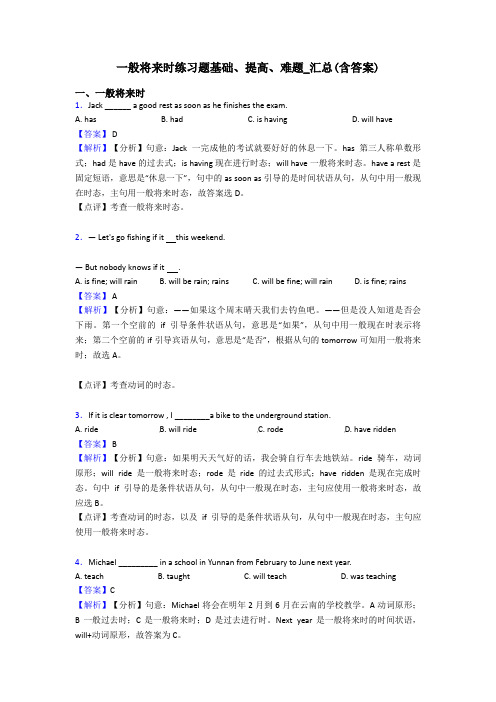
一般将来时练习题基础、提高、难题_汇总(含答案)一、一般将来时1.Jack ______ a good rest as soon as he finishes the exam.A. hasB. hadC. is havingD. will have【答案】 D【解析】【分析】句意:Jack一完成他的考试就要好好的休息一下。
has第三人称单数形式;had是have的过去式;is having现在进行时态;will have一般将来时态。
have a rest是固定短语,意思是“休息一下”,句中的as soon as引导的是时间状语从句,从句中用一般现在时态,主句用一般将来时态,故答案选D。
【点评】考查一般将来时态。
2.— Let's go fishing if it this weekend.— But nobody knows if it .A. is fine; will rainB. will be rain; rainsC. will be fine; will rainD. is fine; rains 【答案】 A【解析】【分析】句意:——如果这个周末晴天我们去钓鱼吧。
——但是没人知道是否会下雨。
第一个空前的if引导条件状语从句,意思是“如果”,从句中用一般现在时表示将来;第二个空前的if引导宾语从句,意思是“是否”,根据从句的tomorrow可知用一般将来时;故选A。
【点评】考查动词的时态。
3.If it is clear tomorrow , I ________a bike to the underground station.A. rideB. will rideC. rodeD. have ridden【答案】 B【解析】【分析】句意:如果明天天气好的话,我会骑自行车去地铁站。
ride骑车,动词原形;will ride是一般将来时态;rode是ride的过去式形式;have ridden是现在完成时态。
一般将来时练习题含答案及解析
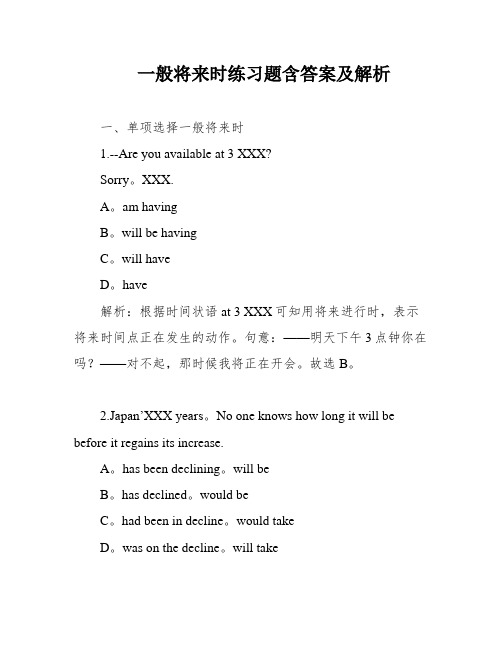
一般将来时练习题含答案及解析一、单项选择一般将来时1.--Are you available at 3 XXX?Sorry。
XXX.A。
am havingB。
will be havingC。
will haveD。
have解析:根据时间状语at 3 XXX可知用将来进行时,表示将来时间点正在发生的动作。
句意:——明天下午3点钟你在吗?——对不起,那时候我将正在开会。
故选B。
2.Japan’XXX years。
No one knows how long it will be before it regains its increase.A。
has been declining。
will beB。
has declined。
would beC。
had been in decline。
would takeD。
was on the decline。
will take解析:根据句意和时间指示词XXX和介词before可以判断前后应该分别采用现在完成进行时和一般将来时。
句意:日本经济在过去20年里一直在下滑。
谁也不知道在它恢复增长前还需要多长的时间。
根据句意可以判断,故选A。
3.If y ou add his wife’s e to his own。
the total of their e will add up to 3000 yuan.A。
add。
to。
will add up toB。
add up。
to。
adds up toC。
adds。
to。
will add up toD。
adds up。
to。
adds up to解析:主句用一般将来时,从句用一般现在时表将来。
Add。
to把。
加在。
add up to总计达。
add to增添。
句意:如果把他妻子的收入和他的收入加起来,总计达3000元。
故选A。
4.我下个星期六将要前往北京。
你知道星期六最早的航班什么时候起飞吗?(改写句子,删除明显有问题的选项)5.“你的窗户还是开着的吗?太冷了!” “哦,对不起,它们关不上。
英语一般将来时题20套(带答案)
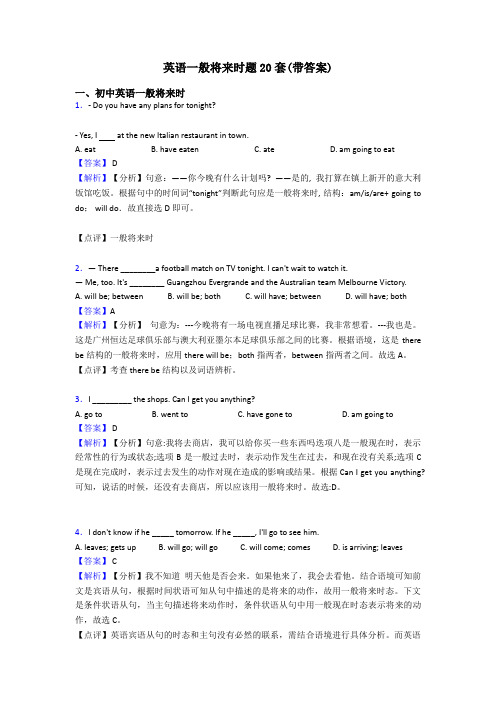
英语一般将来时题20套(带答案)一、初中英语一般将来时1.- Do you have any plans for tonight?- Yes, I at the new Italian restaurant in town.A. eatB. have eatenC. ateD. am going to eat【答案】 D【解析】【分析】句意:——你今晚有什么计划吗? ——是的, 我打算在镇上新开的意大利饭馆吃饭。
根据句中的时间词“tonight”判断此句应是一般将来时, 结构:am/is/are+ going to do; will do.故直接选D即可。
【点评】一般将来时2.— There ________a football match on TV tonight. I can't wait to watch it.— Me, too. It's ________ Guangzhou Evergrande and the Australian team Melbourne Victory.A. will be; betweenB. will be; bothC. will have; betweenD. will have; both【答案】A【解析】【分析】句意为:---今晚将有一场电视直播足球比赛,我非常想看。
---我也是。
这是广州恒达足球俱乐部与澳大利亚墨尔本足球俱乐部之间的比赛。
根据语境,这是there be结构的一般将来时,应用there will be;both指两者,between指两者之间。
故选A。
【点评】考查there be结构以及词语辨析。
3.I _________ the shops. Can I get you anything?A. go toB. went toC. have gone toD. am going to【答案】 D【解析】【分析】句意:我将去商店,我可以给你买一些东西吗迭项八是一般现在时,表示经常性的行为或状态;选项B是一般过去时,表示动作发生在过去,和现在没有关系;选项C 是现在完成时,表示过去发生的动作对现在造成的影响或结果。
【英语】 英语一般将来时专题练习(及答案)含解析
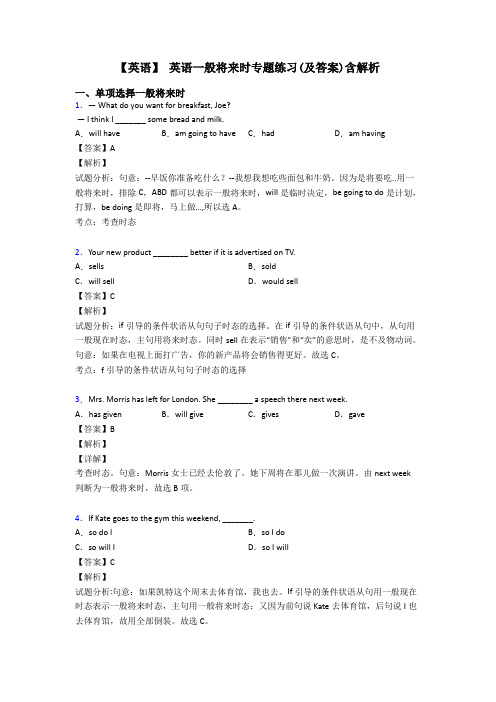
【英语】英语一般将来时专题练习(及答案)含解析一、单项选择一般将来时1.— What do you want for breakfast, Joe?— I think I _______ some bread and milk.A.will have B.am going to have C.had D.am having【答案】A【解析】试题分析:句意:--早饭你准备吃什么?--我想我想吃些面包和牛奶。
因为是将要吃..用一般将来时,排除C,ABD都可以表示一般将来时,will是临时决定,be going to do是计划,打算,be doing是即将,马上做…,所以选A。
考点:考查时态2.Your new product ________ better if it is advertised on TV.A.sells B.soldC.will sell D.would sell【答案】C【解析】试题分析:if引导的条件状语从句句子时态的选择。
在if引导的条件状语从句中,从句用一般现在时态,主句用将来时态。
同时sell在表示“销售”和“卖”的意思时,是不及物动词。
句意:如果在电视上面打广告,你的新产品将会销售得更好。
故选C。
考点:f引导的条件状语从句句子时态的选择3.Mrs. Morris has left for London. She ________ a speech there next week.A.has given B.will give C.gives D.gave【答案】B【解析】【详解】考查时态。
句意:Morris女士已经去伦敦了。
她下周将在那儿做一次演讲。
由next week判断为一般将来时,故选B项。
4.If Kate goes to the gym this weekend, _______.A.so do I B.so I doC.so will I D.so I will【答案】C【解析】试题分析:句意:如果凯特这个周末去体育馆,我也去。
- 1、下载文档前请自行甄别文档内容的完整性,平台不提供额外的编辑、内容补充、找答案等附加服务。
- 2、"仅部分预览"的文档,不可在线预览部分如存在完整性等问题,可反馈申请退款(可完整预览的文档不适用该条件!)。
- 3、如文档侵犯您的权益,请联系客服反馈,我们会尽快为您处理(人工客服工作时间:9:00-18:30)。
一、选择题有详解:(相对练习二—四稍难。
)1. “The meeting is scheduled to begin at 7 o’clock.”“But _______ a delay.”A. It will beB. there’d beC. there will beD. there is2. He’ll leave for Paris before you ______ next week.A. will come backB. will be backC. come backD. came back3. Our next meeting _______ on 1st December.A. has been heldB. will holdC. is to be heldD. is holding4. Where ________ is a will, there is a way.A. there will haveB. has been thereC. there isD. there has been5. It ________ be Wednesday tomorrow.A. is going toB. willC. is about toD. is to答案及详解:1. 选C。
此中there is有“其中包括、有”的涵义。
本句表达会有延误,而非是个延误。
2. 选C。
before引导时间状语从句,在状语从句中一般现在时取代一般将来时。
且,一个简单句没有连词,不能有两个谓语动词。
3. 选C。
next meeting表将来,will do/shall do/be going to do/ be to/ be about to都可以表示将来时。
此中,会议被开要用被动,故,只能选择C。
4. 选C。
“有志者事竟成”固定句型。
此中,地点状语从句,一般现在时代替一般将来时。
5. 选B。
will do/shall do/be going to do/ be to/ be about to都可以表示将来时。
只是,willdo/shall do客观;而be going to do/ be to/ be about to都有计划打算的意思。
并不是星期三显然是客观事实,并不是打算计划。
二、用所给动词的一般将来时填空1. I ______(leave)in a minute. I ______(finish)all my work before I ______ (leave).2. —How long _____ you _____(study)in our country?—I _____(plan)to be here for about one more year.—I _____(hope)to visit the other parts of your country.—What ______ you ______(do)after you ______(leave)here?—I ______(return)home and ______(get)a job.3. I ______(be)tired. I ______(go)to bed early tonight.4. Mary’s birthday is next Monday, her mother _____(give)her a present.5. It is very cold these days. It ______(snow)soon.6. —_____ you _____(be)here this Saturday?—No. I ______(visit)my teacher.7. —______ I ______(get)you a copy of today’s newspaper?—Thank you.8. I am afraid there ______(be)a meeting this afternoon. I can’t join you.9. Mike ______(believe, not)this until he ______(see)it with his own eyes.10. Most of us don’t think their team ______(win).参考答案:1. am leaving ; will finish ; leave2. will ; study ; plan ; hope ; will ; do ; leave ; will return ; get3. am ; will4. will give5. will snow6. Will, be ; will visit7. Shall ; get8. will be 9. won’t believe ; sees 10. will win三、单项选择1. There __________ a meeting tomorrow afternoon.A. will be going toB. will going to beC. is going to beD. will go to be2. Charlie ________ here next month.A. isn’t workingB. doesn’t workingC. isn’t going to workingD. won’t work3. He ________ very busy this week, he ________ free next week.A. will be; isB. is; isC. will be; will beD. is; will be4. There ________ a dolphin show in the zoo tomorrow evening.A. wasB. is going to haveC. will haveD. is going to be5. –________ you ________ free tomorrow?– No. I ________ free the day after tomorrow.A. Are; going to; willB. Are; going to be; willC. Are; going to; will beD. Are; going to be; will be6. Mother ________ me a nice present on my next birthday.A. will givesB. will giveC. givesD. give7. – Shall I buy a cup of tea for you?–________. (不,不要。
)A. No, you won’tB. No, you aren’t.C. No, please don’tD. No, please.8. – Where is the morning paper?– I ________ if for you at once.A. getB. am gettingC. to getD. will get9. ________ a concert next Saturday?A. There will beB. Will there beC. There can beD. There are10. If they come, we ________ a meeting.A. haveB. will haveC. hadD. would have11. He ________ her a beautiful hat on her next birthday.A. givesB. gaveC. will givingD. is going to give12. He ________ to us as soon as he gets there.A. writesB. has writtenC. will writeD. wrote13. He ________ in three days.A. coming backB. came backC. will come backD. is going to coming back14. If it ________ tomorrow, we’ll go roller-skating.A. isn’t rainB. won’t rainC. doesn’t rainD. doesn’t fine15. – Will his parents go to see the Terra Cotta Warriors tomorrow?– No, ________ (不去).A. they willn’tB. they won’t.C. they aren’tD. they don’t.16. Who ________ we ________ swimming with tomorrow afternoon?A. will; goB. do; goC. will; goingD. shall; go17. We ________ the work this way next time.A. doB. will doC. going to doD. will doing18. Tomorrow he ________ a kite in the open air first, and then ________ boating in the park.A. will fly; will goB. will fly; goesC. is going to fly; will goesD. flies; will go19. The day after tomorrow they ________ a volleyball match.A. will watchingB. watchesC. is watchingD. are going to watch20. There ________ a birthday party this Sunday.A. shall beB. will beC. shall going to beD. will going to be21. They ________ an English evening next Sunday.A. are havingB. are going to haveC. will havingD. is going to have22. ________ you ________ free next Sunday?A. Will; areB. Will; beC. Do; beD. Are; be23. He ________ there at ten tomorrow morning.A. willB. isC. will beD. be24. ________ your brother ________ a magazine from the library?A. Are; going to borrowB. Is; going to borrowC. Will; borrowsD. Are; going to borrows25. – Shall I come again tomorrow afternoon?–________ (好的).A. Yes, pleaseB. Yes, you will.C. No, pleaseD. No, you won’t.26. It ________ the year of the horse next year.A. is going to beB. is going toC. will beD. will is27. ________ open the window?A. Will you pleaseB. Please will youC. You pleaseD. Do you28. –Let’s go out to play football, shall we?– OK. I ________.A. will comingB. be going to comeC. comeD. am coming29. It ________ us a long time to learn English well.A. takesB. will takeC. spendsD. will spend30. The train ________ at 11.A. going to arriveB. will be arriveC. is going toD. is arriving参考答案:1. C2. D3. D4. D5. D6. B7. C8. D9. B 10. B 11. D 12. C 13. C 14. C 15. B 16. D 17. B 18. A 19. D 20. B 21. B 22. B 23. C 24. B25. A 26. A 27. A 28. D 29. B 30. D四、把下列各句译成英语1.我叔叔今晚要来。
